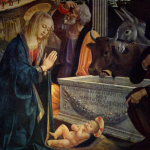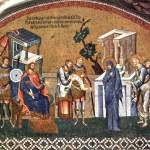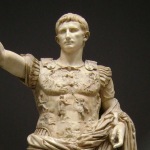Why History isn’t Scientific (And Why it Can Still Tell Us About the Past)
by Tim O'Neill
Filed under History
In April last year, Grundy, the author of the Deity Shmeity blog, wrote a post titled "History Isn't My Area". He commented on the release of Bart Ehrman's critique of Mythicism, Did Jesus Exist?: The Historical Argument for Jesus of Nazareth. Unlike the majority of actual historians, many prominent atheists find Jesus Mythicism convincing and many of them are unhappy with the generally sceptical and highly renowned Ehrman for criticizing this idea. Grundy, for his part, stated frankly "I honestly have little knowledge as to whether or not Jesus existed", though he added "I tend to think he did". That said, he made it clear why the overwhelming consensus of historians and other relevant scholars that the Jesus Myth idea is junk was underwhelming for him:
"History sucks. Okay, that’s unfair, but it was never my subject. My confidence of the accuracy of historical events goes down exponentially with the paper trail. The idea that history is written by the victors highlights the biases of the past. Books are burned. Records fade. Who should I trust for an accurate portrayal of events two thousand years ago?"
Since history actually is my area, I responded by making some critical comments on this attitude and some points about how history , as an academic discipline, is studied. Grundy was happy to listen, and even invited me to expand on my points, which I'm doing here.
Atheists and Historical Illiteracy
I should begin, however, by pointing out that I am an atheist. I have been an atheist for my entire adult life, am a paid up member of several atheist and skeptical organizations and have a 21 year online record of posting to discussions as an unbeliever. I note this because I've found that when I begin to criticize my fellow atheists and their grasp of history or historiography, people tend to assume I must be some kind of theistic apologist (which doesn't follow at all, but this happens all the time anyway).
After 30+ years of observing and taking part in debates about history with many of my fellow atheists I can safely claim that most atheists are historically illiterate. This is not particular to atheists: they tend to be about as historically illiterate as most people, since historical illiteracy is pretty much the norm. But it does mean that when most (not all) atheists comment about history or, worse, try to use history in debates about religion, they are usually doing so with a grasp of the subject that is stunted at about high school level.
This is hardly surprising, given that most people don't study history past high school. But it means their understanding of any given historical person, subject or event is (like that of most people), based on half-remembered school lessons, perhaps a TV documentary or two and popular culture: mainly novels and movies.
Worse, this also means that most atheists (again, like most people) have a grasp of how history is studied and the techniques of historical analysis and synthesis which is also stunted at high school level - i.e. virtually non-existent. With a few laudable exceptions, high school history teachers still tend to reduce history to facts and dates, organized into themes or broad topics. How we can know what happened in the past, with what degree of certitude we can know it, and the techniques used to arrive at these conclusions are rarely more than touched on at this level. This means that when the average atheist (yet again, like the average person generally) grasps that our knowledge of the past is not as cut and dried and clear as Mr. Wilkins the history teacher led us to understand, they tend to reject the whole thing as highly uncertain at best or subjective waffling at worst. Or, as Grundy put it, as "crap".
This rejection can be more pronounced in atheists, because many (again, not all) come to their atheism via a study of science. Science seems very certain compared to history. You can make hypotheses and test them in science. You can actually prove things. Scientific propositions are, by definition, falsifiable. Compared to science, history can seem like so much hand-waving, where anyone can pretty much argue anything they like.
History and Science
In fact, history is very much a rigorous academic discipline, with its own rules and methodology much like the hard sciences. This does not mean it is a science. It is sometimes referred to as one, especially in Europe, but this is only in the broader sense of the word; as in "a systematic way of ordering and analyzing knowledge". But before looking at how the historical method works, it might be useful to look at how sciences differ from it.
The hard sciences are founded on the principle of probabilistic induction. A scientist uses an inductive or "bottom up" approach to work from observing specific particulars ("mice injected with this drug put on less fat") to general propositions ("the drug is reducing their appetite"). These propositions are falsifiable via empirical testing to rule out other explanations of the particulars ("the drug is increasing their metabolism" or "those mice are more stressed by being stuck with syringes") and so can be tested.
This is all possible in the hard sciences because of some well-established laws of cause and effect that form a basis for this kind of induction. If something is affecting the mice in my examples above today, it will affect them in the same way tomorrow, all things being equal. This allows a scientist to work from induction to make an assessment of probable causation via empirical assessment and do so with a high degree of confidence. And their assessment can be confirmed by others because the empirical measures are controlled and repeatable.
Unfortunately, none of this works for the study of the past. Events, large and small, occur and then are gone. A historian can only assess information about them from traces they may, if we are lucky, leave behind. But unlike a researcher from the hard sciences, a historian can't run the fall of the Western Roman Empire through a series of controlled lab experiments. He can't even observe the events, as a zoologist might observe the behavior of a gorilla band, and draw conclusions. And there aren't well-defined laws and principles at work (apart from in a very broad and subjective sense) that allow him to, say, simulate the effects of the rise of the printing press or decide on the exact course of the downfall of Napoleon the way a theoretical physicist can with the composition of a distant galaxy or the formation of a long dead star.
All this leads some atheists, who reject anything that can't be definitively "proven", who reject the idea of any degree of certainty about the past. This is an extreme position and it's rarely a consistent one. As I've noted to some who have claimed this level of historical skepticism, I find it hard to believe they maintain this position when they read the newspaper, even though they should be just as skeptical about being able to know about a car accident yesterday as they are about knowing about a revolution 400 years ago.
The Historical Method
Just because history is not a hard science does not mean it can't tell us about the past or can't do so with a degree of certainty. Early historians like Herodotus established the beginnings of the methods used by modern historical researchers, though historians only began to develop a systematic methodology based on agreed principles from the later eighteenth century onwards, using the techniques of Barthold Niebuhr(1776-1831) and Leopold von Ranke (1795-1886).
The Historical Method is based on three fundamental steps, each of which has its own techniques:
1. Heuristic - This is the identification of relevant material to use as sources of information. These can range from the obvious, such as a historian of the time's account, who records events he witnessed personally, to the much less obvious, like a medieval manor's account book detailing purchases for the estate. Everything from archaeological finds to coins to heraldry can be relevant here. The key word here is "relevant", and there is a high degree of skill in working out which sources of information are pertinent to the subject in question.
2. Criticism - This is the process of appraising the source material in light of the question being answered or subject being examined. It involves such things as determining the level of "authenticity" of a source (Is it what is seems to be?), its "integrity" (Can its account be trusted? What are its biases?), its context (What genre is it? Is it responding or reacting to another source? Is it using literary tropes that need to be treated with skepticism?) Material evidence, such as archaeology, architecture, art , coins, etc. needs to be firmly put into context to be understood. Documentary sources also need careful contextualization - the social conditions of their production, their polemical intent (if any), their reason for production (more important for a political speech than a birth certificate, for example) , their intended audience and the background and biases of their writer (if known) all have to be taken into account.
3. Synthesis and Exposition - This is the formal statement of the findings from steps 1 and 2, which each find support by reference to the relevant evidence.
The main difference between this method and those used in the hard sciences is that the researcher lays all this material, its analysis, and his conclusions out systematically, but the conclusions are a subjective assessment of likelihood rather than an objective statement of probabilistic induction. This subjectivity is what many trained in the sciences find alien about history and lead them to reject history as insubstantial.
But the key thing to understand here is that the historian is not working toward an absolute statement about what definitely happened in the past, since that is generally impossible except on trivial points (e.g., there is no doubt that Adolf HItler was born on April 20, 1889). A historian instead works to present what is called "the argument to the best explanation". In other words, the argument that best accounts for the largest amount of relevant evidence with the least number of suppositions. This means that the Principle of Parsimony, also known as Occam's Razor, is a key tool in historical analysis; historians always favor the most parsimonious interpretation that takes account of the most available evidence.
Which finally brings us back to the existence of Jesus. It is far more parsimonious to conclude that Christianity's figure of "Jesus Christ" evolved out of the ideas of the followers of a historical Jewish preacher, since all of our earliest information tells us that this "Jesus Christ" was a historical Jewish preacher who had been executed circa 30 CE. People have tried to propose alternative origins for the figure of "Jesus Christ", positing an earlier Jewish sect that believed in a purely celestial figure who became "historicized" into an earthly, historical Jesus later. But there is no evidence of any such proto-Christian sect and no reason such a sect would exist and then vanish without leaving any trace in the historical record. This is why historians find these "Jesus Myth" hypotheses uncompelling - they are not the most parsimonious way of looking at the evidence and require us to imagine ad hoc, "what if" style suppositions to keep them from collapsing.
Ways Atheists (Sometimes) Get History Wrong
Managing this process of systematic historical analysis requires training, practice, and a degree of skill. Without these, it's very easy to do something that looks a bit like historical analysis and arrive at flawed conclusions.
Take the initial heuristic process, for example. I've come across many atheists who don't accept that a historical Jesus existed on the grounds that "there are no contemporary references to him and all references to him are later hearsay" or even that "there are no eyewitness accounts of his career". So they rule out any evidence we do have referring to him on the basis that it is not contemporary and/or from eyewitnesses. But if we ruled out any reference to an ancient, medieval, or pre-modern person or event on these grounds, we'd effectively have to abandon the study of early history: we don't have contemporary evidence for most people and events in the ancient world, so this would make almost all of our sources invalid, which is clearly absurd. Given that we have no eyewitness or contemporary sources for far more prominent figures, such as Hannibal, expecting them for a peasant preacher like Jesus is clearly ridiculous. No historian of the ancient world would regard this as a valid historical heuristic.
Atheists can often make similar, elementary errors in the criticism of sources as well. There is no shortage of lurid material on the horrors of the Inquisition, with whole books detailing vile tortures and giving accounts of hundreds of thousands of wretched victims being consigned to the flames by the Catholic Church. In the past, nineteenth century writers took these sources at face value, and until the early twentieth century this was essentially the story of the Inquisition to be found in textbooks, especially in the English-speaking (i.e. substantially Protestant) sphere.
But much of this was based on sources that had severe biases - mainly sixteenth and seventeenth century Protestant polemical material, usually produced in England which, as a political, religious and economic enemy of Spain, was hardly going to produce unbiased accounts of the Spanish church and crown's use of the Inquisition. Uncritical use of this material gives a warped, enemy's-eye-view of the Inquisition that has been substantially overturned by more careful analysis of the source material and the Inquisition's own records. The result is that it is now known that in the 160 years of its operation in Spain, the Inquisition resulted in 3,000-5,000 executions, not the hundreds of thousands alleged by uncritical nineteenth century writers like Henry Charles Lea. Basing an argument on the earlier, uncritical accounts of the Inquisition might suit many atheists' agendas, but it would be bad history nonetheless.
Finally, historical synthesis and exposition requires at least an attempt at a high degree of objectivity. An analyst of the past may have personal beliefs with the potential to bias their analysis and incline them towards certain conclusions. Worse, these beliefs could make them begin with assumptions about the past and so make them select only the evidence that supports this a priori idea. Historians strive to avoid both and examine the evidence on its merits, though polemicists often don't bother with this objective approach. All too often many atheists can be polemicists when dealing with the past, only crediting information or analysis that fits an argument against religion they are trying to make while downplaying, dismissing, or ignoring evidence or analysis that does not fit their agenda. Again, this is bad history and rarely serves any function other than preaching to the converted.
For example, until the early twentieth century the history of science was popularly seen as a centuries-long conflict between forward thinking scientific minds trying to advance knowledge and human progress but constantly being persecuted and suppressed by retrograde religious forces determined to retard scientific progress. Again, in the mid-twentieth century historians of science reassessed this general idea and rejected what is now referred to as the "Conflict Thesis", presenting a far more complex, nuanced and well-founded analysis of the development of science that shows that while there were occasional conflicts, which were rarely as simple as "science versus religion", religion was usually neutral on the rational analysis of the physical world and often actively supportive of it. Overt conflicts, such as the Galileo Affair, were exceptions rather than the rule and, in that case as in many others, more complicated than simply “religion” repressing “science”.
Objectivity, Bias, and Historical Fables
We atheists and freethinkers regularly deride believers for their irrational thinking, lack of critical analysis and tendency to cling to ideas out of faith even when confronted by contrary evidence. Unfortunately, it’s a lot easier to talk about being rational, and criticize others for not being so, than it is to practice what we preach. Everyone has their biases, and “confirmation bias” - the tendency to favor information that confirms our prior beliefs - is an innate psychological propensity that is hard to counter even when we are aware of it. This means that atheists can, in many cases, be as bad as believers in accepting appealing ideas without checking their facts, holding to common misconceptions in the face of contrary evidence, and liking neat, simple stories over messy, complex, and more detailed alternatives that happen to be more solidly supported by the evidence.
The idea that the medieval Church taught the earth was flat, that Columbus bravely defied their primitive Biblical superstition and proved they were wrong by sailing to America, is a great story. Unfortunately, it’s also historical nonsense – a fable with zero basis in reality. It’s bad enough that I have had the experience of intelligent and educated atheists repeating this story as an example of the Church holding back progress without bothering to check if it’s true. What’s worse is that I’ve also experienced atheists who have been shown extensive, clear evidence that the medieval Church taught the earth was round, and that the myth of medieval Flat Earth belief was invented by the novelist Washington Irving in 1828, and they have simply refused to believe that the myth could be wrong.
Neat historical fables such as the ones about Christians burning down the Great Library of Alexandria (they didn’t) or murdering Hypatia because of their hatred of her learning and science (ditto) are appealing parables. Which means some atheists fight tooth and nail to preserve them even when confronted with clear evidence that they are pseudo historical fairy tales. Fundamentalists aren’t the only ones who can be dogmatic about their myths.
One of the main reasons for studying history is to get a better understanding of why things today are as they are by grasping what has gone before. But it only works with a good grasp of how we can know about the past, the methods of analysis used, and the relevant material our understanding should be based on. It also only works if we strive to put aside what we may like to be true along with any preconceptions (since they are often wrong) and look at the material objectively. Atheists who attempt to use history in their arguments who don’t do these things can not only end up getting things badly wrong, but can also wind up looking as misinformed or even as dogmatic as fundamentalists. And that’s not a good look.
Related Posts
Note: Our goal is to cultivate serious and respectful dialogue. While it's OK to disagree—even encouraged!—any snarky, offensive, or off-topic comments will be deleted. Before commenting please read the Commenting Rules and Tips. If you're having trouble commenting, read the Commenting Instructions.













